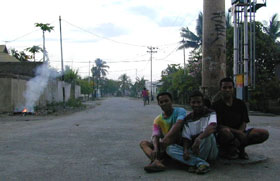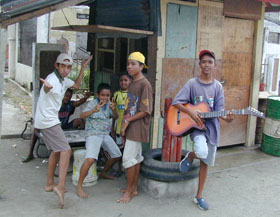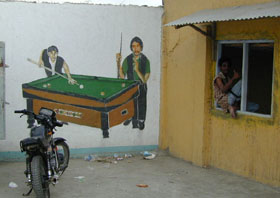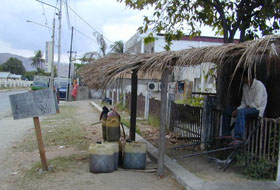East Timor Remembers and Looks Ahead
After the Election, Part II of II
"Blood splattered onto his family members," Dulcy says of the murder by gunshot to the head of a man at the hands of an Indonesian militia. He was waiting in line with Dulcy to board a ship and leave Dili, East Timor for Kupang, West Timor on September 7, 1999. The militia told the other people in line to cover their ears. "We couldn't do anything," she says, "because we were scared."
 At the time, the militias were in the process of deporting East Timorese from Dili following their vote for independence from Indonesian rule. The militias were working with the Indonesian Army and saw the East Timorese as being members of one of two camps: those in favor of independence and those favoring limited autonomy within the framework of Indonesian sovereignty. After the election, many of those found by the army to be in favor of independence were killed by the militias. Strong evidence was not needed to determine such loyalties. Dulcy says that the army believed that men with long hair were in favor of independence. This man had long hair.
At the time, the militias were in the process of deporting East Timorese from Dili following their vote for independence from Indonesian rule. The militias were working with the Indonesian Army and saw the East Timorese as being members of one of two camps: those in favor of independence and those favoring limited autonomy within the framework of Indonesian sovereignty. After the election, many of those found by the army to be in favor of independence were killed by the militias. Strong evidence was not needed to determine such loyalties. Dulcy says that the army believed that men with long hair were in favor of independence. This man had long hair.
Once in the boat, her outlook didn't improve much. "We always worry about ourselves," she says. Of her options, she remembers: "We can arrive in Kupang or maybe we die in the boat."
She did arrive in Kupang eight hours later. But others were not so lucky. "Some people went to the bathroom and they saw the blood," she recalls. "They said maybe the militia killed them. Because after time passed we didn't see one person, two persons. We didn't know if they were dead. But where were they?" It was later learned that the militias were killing people aboard the ships and throwing them into the sea. Some were tossed into the sea alive.
These murders were just a sample of those experienced by thousands of East Timorese and were at the culmination of 24 years of vicious rule by the Indonesian regime. This brutality was first brought to the forefront of the international community with the murder of 200 civilians at a funeral for a pro independence activist at Santa Cruz cemetery by Indonesian troops ten years ago. It again was marked in April 1999 with the killings in a Roman Catholic church and residence in the town of Liquica. After bombing the church with teargas, five hundred militia members hacked 25 people to death with machetes as they ran for cover. Two weeks later, pro independence leader Manuel Carrascalao had his house attacked by militias and his son, 18, was murdered.
 Dulcy, though, didn't see the oppression as selected events, but as a continual part of her life. From government propaganda to killing and theft, she dealt with the oppression daily.
Dulcy, though, didn't see the oppression as selected events, but as a continual part of her life. From government propaganda to killing and theft, she dealt with the oppression daily.
The Indonesian Government claimed on TV and radio that the Indonesian Army and the militias were separate. Dulcy knew different. "The real story is that the militias worked together with the army. The militias killed the people and the army took the things. They brought the Indonesians motorcycles and cars. We were scared of the army. Young people, especially men, if they do something wrong, sometimes they [the militias] kill."
Doing something wrong many times meant participating in a pro independence demonstration. The government would record the demonstration and take notes on the participants. The army would look at "that person or that face and they would say, 'he is wrong.'" Of course, being labeled as "wrong" is the same as being marked for a planned death. "When they [army] saw them [participants] again, maybe [later] there will be a problem or accident in the street."
The Indonesian regime so adamantly attempted to squash the independence movement in East Timor for fear that similar movements would spring forward in West Papua, Aceh and other regions, resulting in the eventual fracturing of the country. This then necessitated the violence against pro independence people. But what motivation could there be on the part of individual militia members to perform such vicious brutality?
Dulcy heard that oftentimes drugs were used to fuel such violence by the militia members. Anjing gila, or mad dog pills, was the most common drug of choice. It causes a trance-like obedience and crazed behavior in its users. "They just know: kill the people, give more emotion," says Dulcy. "We hear it is the government planning. Like what happened in Liquica. It was part of the preparations to go and kill the people in the church."
The results of the August 30th election were read on September 4th. With word of an imminent massacre by the militias, many people fled to the hills above Dili, where the core of the independence guerrilla movement was holed up. Others left by boat and plane. It was three days later that Dulcy got on the boat.
 Dulcy spent three and half months in Kupang before returning to Dili. Her waitressing job keeps her bright, energetic, and happy, even though her home and family were tormented just two years prior. Her job is also one reason to look forward to the future. "The situation [now] is very different," she explains. "Before, we didn't feel peace. Now we feel very free. We can work any time, until nighttime. Before, we never go out after 8 PM. Two or three years ago, not many young people worked. They just study and then stay at home."
Dulcy spent three and half months in Kupang before returning to Dili. Her waitressing job keeps her bright, energetic, and happy, even though her home and family were tormented just two years prior. Her job is also one reason to look forward to the future. "The situation [now] is very different," she explains. "Before, we didn't feel peace. Now we feel very free. We can work any time, until nighttime. Before, we never go out after 8 PM. Two or three years ago, not many young people worked. They just study and then stay at home."
Now it is after the August 30th constituent election of this year. The resistance party Fretilin won 55 of the 88 seats in the constituent assembly. Thus giving the party the responsibility of continuing with the peace and freedom that Dulcy is referring to.
Perhaps equally important though is the presidential election of next year. Xanana Gusmao, "the father of East Timorese independence," has decided to become a candidate. Thus far, he has political support in many of the 16 political parties making up the newly elected 88-member constituent assembly.
His general approach to reviving his country is seen as practical when compared to that of other leaders' demands of persecution for those responsible for the horrors of two years ago. In the Los Angeles Times, Gusmao says, "If they burned our house, why don't we ask them to build the house instead of putting them in prison. There are many ways of justice."
"For me, he is a very perfect man,"
Dulcy says of Gusmao. "Because he has charisma. He has
responsibility for his people and he does everything for his
country. I want and wish for all to do what he does."
 In December, Dulcy will take a test to go to school in Australia. The results come in February. Failing that, there are Portuguese scholarship tests early next year. "I wish that all the people will study and go to school. Maybe we will have a good future in our country."
In December, Dulcy will take a test to go to school in Australia. The results come in February. Failing that, there are Portuguese scholarship tests early next year. "I wish that all the people will study and go to school. Maybe we will have a good future in our country."
Perhaps of more immediate importance for her though is learning American slang. Specifically, she wants to understand the difference between "What's up?" and "What's up, doc?"
Should be easier than an 8-hour boat ride to Kupang.
The Diamondbacks had a comfortable lead in the bottom of the sixth and Schilling was throwing strikes. Game 1 looked to be in the bag. I reached into my jacket pocket.
"Do you think the boss will be satisfied?" I asked, lighting up a cigarette.
"Perhaps, but there still is the matter of your Cambodia reports." She slapped the back of her right hand into her left palm and stared straight at me.
"Well, I'll be sure to get on those as soon as my favorite junior reporter supplies me with a coffee chaser for this whiskey." I tilted my head back and exhaled a tight funnel of smoke.
She stormed back into the newsroom.
No coffee in sight but the fog had slowly lifted.
Coming next week: a report from Cambodia

